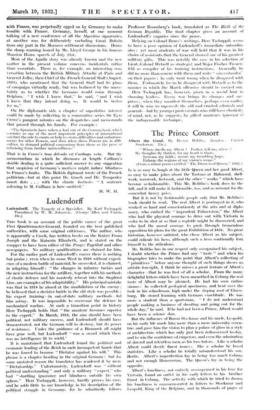Ludendorff
Tins book is an account of the public career of the great First Quartermaster-Gcneral, founded on the best published authorities, with some original criticisms. The author, who is apparently a Czech, has written books on the Kaiser Franz Joseph and the Kaiscrin Elizabeth, and is stated on the wrapper to have been editor of the Prager Tagebtatt and other newspapers. No military qualifications arc claimed for him.
For the earlier part of Ludendorff's career there is nothing but praise ; even when he came West in 1916 without experi- ence of a modern battle of material, he succeeded, it is claimed, in adapting himself : " the changes in infantry tactics and the new instructions for the artillery, together with his methods of elastic defence and his masterly retreat into the Siegfried Line, are examples of his adaptability." His principal mistake was that in 1918 he aimed at the annihilation of the enemy ; he believed that a decisive battle in the old style was possible ; his expert training-s--in out-of-date military methods - led him astray. It was impossible to overcome the defence in mechanized warfare. At such a transition point in history Herr Tschuppik holds that " the amateur Jimmies superior to the expert." In March, 1918, the aim should have been political, not military success, and Ludendorff should have demonstrated, not the German will to destroy, but its power iif resistance. Under the guidance of it Bismarck all might have gone well, but Ludendorff " was a sword which there was no intelligence lit to wield."
It is maintained that Ludendorff found the political and economic leading of the Reich in such incompetent hands t hat he was kneed to become "Dictator against his will." This phrase is a chapter heading in the original German : but for sonic unstated reason the translator has rendered it by mere " Dictatorship." Unfortunately, Ludendorff was " without political understanding " and only a military " expert,'" who had startling ignorance and blindness outside his own sphere." Ben' Tschuppik, however, hardly proves his ease, and he adds little to our knowledge in his description of the potitical struggle in Germany, for he admittedly follows Professor Rosenberg's book, translated as The Birth of the .German Republic. The final chapter gives an account of Ludendorff's vagaries since the peace.
Belying on Colonel Mauve's writings, Derr Tschuppik SCOW: to have a maw opinion of Ludendorff's immediate subordin- ates ; yet most students of war will hold that it was in his choice of assistants that the General showed one of his greatest military gifts. This was notably the ease in his selection of Lieut.-Colonel Wetzel! as strategist and Major Fischer-Treuen- feld as compiler of his training instructions. Generally he did 110 more than mmeur with them and write " chi:Yrs/am:fen': on their papers ; he only went wrong when Ise disagreed with them. Fortunately for us he disagreed with Wet zell as to the manner in which the March offensive should be carried caul. Herr Tschuppik has, however, given us a useful hint in choosing leaders. Every war brings its changes and sur- mises; When they manifest themselves, perhaps even earlier, it will he wise to supersede I Inc old and crusted admirals antl generals—but by younger professionals still have elasticity of mind, not, as he suggests, by gifted amateurs ignomnt or Ilse indispensable technique.






































 Previous page
Previous page